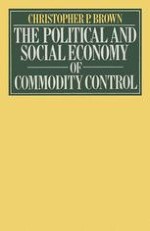1980 | OriginalPaper | Buchkapitel
A Survey of UNCTAD and Recent Cartels
verfasst von : Christopher P. Brown
Erschienen in: The Political and Social Economy of Commodity Control
Verlag: Palgrave Macmillan UK
Enthalten in: Professional Book Archive
Aktivieren Sie unsere intelligente Suche, um passende Fachinhalte oder Patente zu finden.
Wählen Sie Textabschnitte aus um mit Künstlicher Intelligenz passenden Patente zu finden. powered by
Markieren Sie Textabschnitte, um KI-gestützt weitere passende Inhalte zu finden. powered by
Within countries and between them one factor that pervades the political climate is the scarcity that exists in most of the things that people want. Political systems come into being in the first place because of conflicts over these valued things, with the resulting political system providing a framework within which conflict and compromise can occur before decisions are taken. There would have been no need for a political organization such as UNCTAD had there been unanimity between countries about trade and development objectives and the means for meeting them. The present chapter examines how UNCTAD emerged to resolve differences between developed and developing countries over problems of trade and development and the way in which it attempted to resolve these problems. Its more conspicuous accomplishments, particularly the Generalized System of Preferences (GSP) and the International Cocoa Agreement, are discussed below while some of its more intangible accomplishments are covered in chapter 7, and the initiatives taken toward the Integrated Programme for Commodities, in the following chapter. The latter occurred against a background of cartel and producer-association activity, declarations surrounding the concept of a New International Economic Order and parallel initiatives in other forums. Each of these provided impetus for or modification of the Programme, and influenced the underlying social, political and economic dynamics of the issues it raised.
